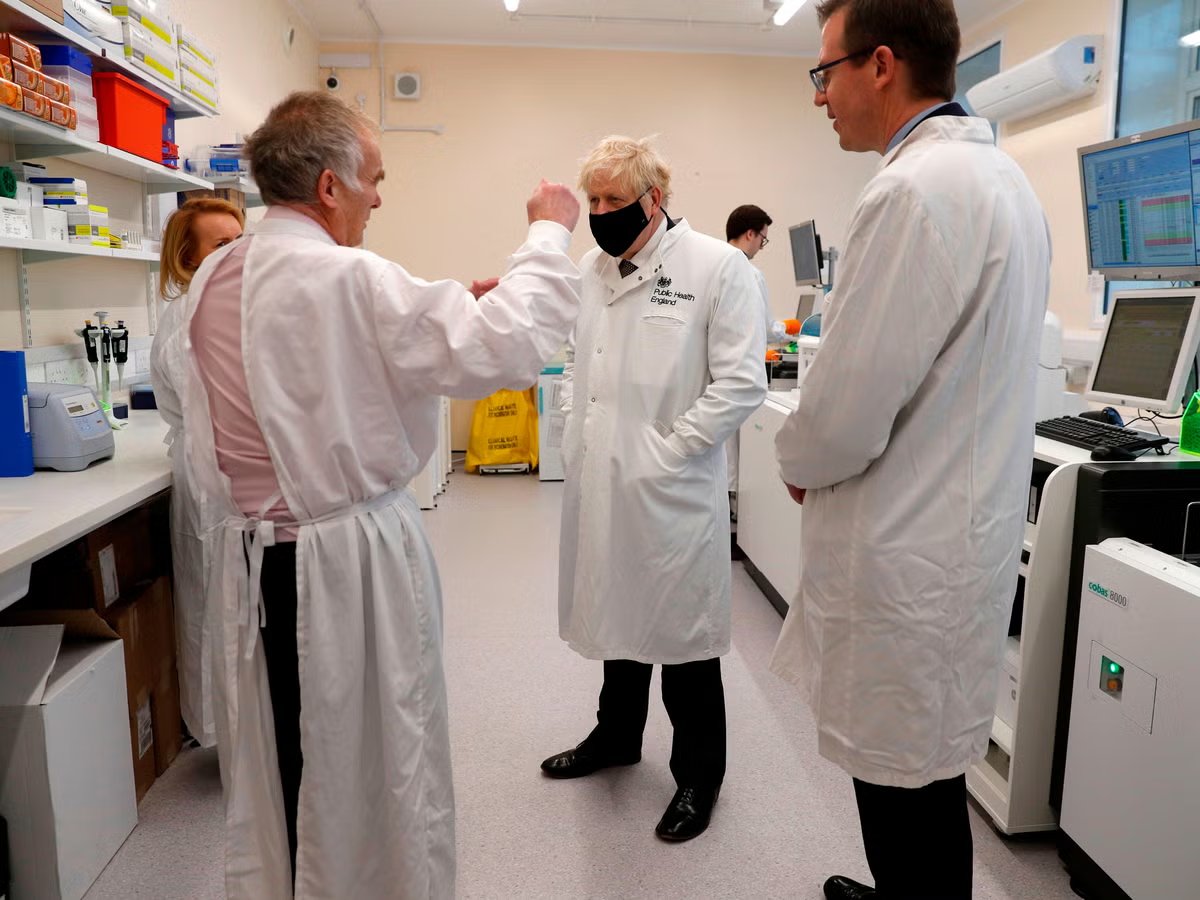The Impact Of Funding Cuts On Scientific Progress
Scientific progress has long been a driving force behind societal advancement, with breakthroughs in various fields shaping the world we live in today. However, the continuous pursuit of knowledge is heavily reliant on funding, and when financial support diminishes, the consequences on scientific progress can be profound. This article delves into the multifaceted repercussions of funding cuts on scientific progress.
Author:Liam EvansReviewer:Luqman JacksonJan 31, 20246.7K Shares118.6K Views

Scientific progress has long been a driving force behind societal advancement, with breakthroughs in various fields shaping the world we live in today. However, the continuous pursuit of knowledge is heavily reliant on funding, and when financial support diminishes, the consequences on scientific progress can be profound. This article delves into the multifaceted repercussions of funding cuts on scientific progress.
The Crucial Role Of Funding In Scientific Research
Financing Discovery
Scientific research, often at the forefront of innovation and knowledge creation, is a multifaceted process demanding substantial financial investments. These funds are imperative for a spectrum of needs, including acquiring cutting-edge equipment, sustaining a skilled workforce, and covering operational expenses. Adequate funding forms the bedrock that empowers scientists to navigate the intricate landscape of discovery.
In the absence of robust financial support, the very essence of scientific exploration is compromised. Groundbreaking discoveries, which have the potential to revolutionize fields like medicine, physics, and environmental science, may falter at the precipice of realization. Without the necessary resources, scientists encounter impediments to conducting experiments, collecting crucial data, and analyzing results, thereby impeding progress in our collective pursuit of knowledge.
Attracting Top Talent
The pursuit of scientific excellence is a global endeavor, and institutions vie for the expertise of top-tier researchers. In this intensely competitive environment, funding serves as a pivotal tool for institutions to attract and retain the brightest minds in the scientific community. Beyond providing state-of-the-art facilities, financial support enables institutions to offer competitive salaries and resources, creating an environment conducive to groundbreaking research.
Top-notch researchers, often sought after for their specialized knowledge and innovative thinking, gravitate toward institutions that can support and nurture their talents. A dearth of funding jeopardizes an institution's ability to assemble and sustain a team of skilled researchers. The consequence is not merely a financial setback but a hindrance to the collaborative efforts essential for significant scientific breakthroughs.
Is Academia Truly Immune To Recession?
The prevailing belief that academia is impervious to economic downturns is challenged when considering the significant cutbacks in research funding during recessions. While funding and grants don't directly generate scientific knowledge, they play a pivotal role in influencing researchers and technicians, shaping the quality and quantity of scientific output. The repercussions of reduced financial support extend beyond academic institutions, affecting industrial research and subsequently diminishing overall knowledge production.
During periods of economic recession, industries often tighten their belts, leading to a reduction in funds allocated for research initiatives. This belt-tightening directly impacts knowledge output from industrial research, as the financial constraints limit the scope and scale of projects. Consequently, the collaboration between academia and industry, a driving force behind many scientific advancements, can experience a downturn, further exacerbating the impact of recession on scientific progress.
Interestingly, the recession of 2008 presented a nuanced scenario for academia. Contrary to the expected decline, academia experienced an unexpected boost as the economic downturn drove a surge in enrollment in PhD programs. The rationale behind this trend lies in the perception of academia as a more stable career path compared to the business sector during times of economic uncertainty.
The decline in employment rates and job opportunities during the recession prompted many individuals to seek refuge in academia, viewing higher education and research as a reliable avenue for career development. Consequently, the increased enrollment in PhD programs during the recession translated into a substantial uptick in research publications throughout the subsequent decade.
However, while academia demonstrated resilience and even thrived in terms of enrollment and research output during the 2008 recession, it's crucial not to underestimate the broader impact of economic downturns on research. The positive trends observed during this particular recession might not be universally applicable, and the overall health of scientific research can still be significantly compromised when financial support dwindles.
Unraveling The Impact Of Recession On Research
In the intricate web of scientific exploration, funding serves as the lifeblood that sustains innovation and propels the frontiers of knowledge. The ebb and flow of economic cycles, particularly recessions, can profoundly influence the landscape of research by diminishing the crucial resources that drive scientific inquiry. Here, we dissect the multifaceted impacts of recession on research, delving into the intricacies of budget constraints, effects on ongoing studies, philanthropic contributions, industry cutbacks, heightened competition for funding, and the ensuing lack of stability.
Sources Of Funding
Before delving into the impacts, it's crucial to recognize the diverse sources of funding that catalyze research endeavors:
- Government Grants:These funds often form a significant portion of research budgets, providing essential support for a myriad of scientific projects.
- Philanthropic Organizations:Charities, trusts, and other philanthropic entities play a pivotal role, contributing substantial resources to biomedical research and various scientific initiatives.
- Industry Funding:Collaboration between academic institutions and industries, particularly in sectors like pharmaceuticals, bolsters research opportunities and financial support.
Impacts Of Recession On Research
Budget Cuts
Recessions prompt governments to reassess priorities, leading to budget cuts in various sectors. Research funding may witness a reduction, with resources diverted to areas deemed more immediate, such as healthcare, the economy, or defense. The aftermath of the 2008 recession saw significant cuts by the National Institute of Health (NIH), freezing numerous projects and impacting the scientific community.
Effects On Ongoing Studies
Decreased funding can abruptly terminate ongoing projects, especially in clinical studies involving patients. The repercussions extend beyond financial setbacks, adversely affecting participants and posing challenges in restarting studies, demanding additional resources.
Reduced Philanthropic Contribution
Philanthropic organizations, pivotal in funding research, may witness a decline in contributions during a recession. Decreased disposable income and a shift in focus to charitable causes can impede projects dependent on these sources.
Industry Cutbacks
Industries, despite certain sectors being recession-resistant, may curtail funds for research and development. Life sciences companies, typically considered resilient, may face challenges, resulting in diminished collaboration with academia and limiting research opportunities.
Increased Competition For Funding
Securing research grants becomes a herculean task during a recession, jeopardizing the careers of researchers. Stagnant salaries, job terminations, and heightened competition may lead to misconduct, intensifying scrutiny in the grant-reviewing process.
Lack Of Stability
Restricted funding translates to limited resources, making research less attractive and potentially driving researchers to seek opportunities elsewhere. Short-term contracts and temporary employment surge, destabilizing careers and hindering talent retention.
Strategies To Mitigate The Impact Of Recession On Research
In the face of economic downturns, particularly recessions, the scientific community must navigate challenges and proactively implement strategies to counter the adverse effects on research. Here are six key steps to foster resilience and sustain scientific progress:
Foster Collaboration
Interdisciplinary Collaboration
Researchers, irrespective of social, cultural, and political backgrounds, can collaborate across disciplines. Interdisciplinary collaboration not only enriches the research process but also facilitates the pooling of diverse expertise.
Academia-Industry Partnership
Fostering collaboration between academia and industries is paramount. Joint initiatives can lead to significant cost savings and resource optimization. Laboratories working together can expedite research efforts, mitigating the impact of recession on individual research entities.
Prioritize Science Funding
Advocacy For Funding
Governments and funding agenciesmust prioritize science funding. Policymakers play a crucial role in advocating the importance of research and ensuring the protection of funding, even in times of economic downfall.
Allocation To Potential Projects
Strategic allocation of funds to projects with high potential can optimize the impact of available resources. Governments and funding bodies should identify key areas where research can contribute significantly and direct funds accordingly.
Diversify Funding Sources
Beyond Government Funding
Depending solely on government funding for research may lack long-term sustainability. To establish a resilient financial framework, researchers should consider diversifying funding sources. This diversification can include partnerships with private organizations, collaboration with philanthropic entities, and engagement in international collaborations. Such strategic funding approaches contribute to stability, ensuring research initiatives endure economic uncertainties. For more insights on the impact of climate change in Africa, visit Elm4You.
Collaborative Funding
Collaborative funding models, where multiple organizations contribute to a shared research goal, can further enhance financial stability. This approach not only distributes financial responsibility but also encourages joint commitment to research outcomes.
Interdisciplinary Research
Addressing Pressing Issues
Interdisciplinary research initiatives can address complex problems more effectively. Combining experts from different disciplines not only enriches the research process but also attracts funding from diverse sources interested in innovative solutions.
Innovation And Change
Interdisciplinary collaboration can lead to innovative ideas that address societal challenges and bring about positive change. This, in turn, attracts funding from organizations committed to supporting transformative research.
Communication
Public Outreach
Effective communication is crucial during challenging times. Researchers should communicate the value of their work to the public, enhancing understanding and garnering public support for continued research funding.
Utilize Blogging Platforms
Utilizing open blogging platforms, researchers can share insights into the difficulties they face. Increased visibility can strengthen the case for sustained research funding and open avenues for partnerships with private organizations.
Cost-Effective Innovation
Resource Optimization
Researchers can brainstorm and formulate innovative, cost-effective approaches. Planning strategies that offer more results with limited resources can ensure that research continues to progress even in the face of financial constraints.
Commercialization Opportunities
Cost-effective innovationnot only sustains research but also opens doors for commercialization. By demonstrating the practical applications of their work, researchers increase the likelihood of partnerships with private organizations, ensuring the commercial viability of their research outcomes.
Funding Cuts On Scientific Progress - FAQs
What Are The Challenges Of Research Funding?
Research funding faces several challenges, including its highly competitive nature, uncertainty, and instability due to economic fluctuations. The application processes are often complex, requiring meticulous attention, and funders may exhibit risk aversion, favoring projects with predictable outcomes. Dependency on specific sources, short-term focus, and the lack of sustained planning pose additional obstacles.
How Funding Influences The Direction Of Science?
Funding agencies play a pivotal role in shaping the direction of scientific research. They set agendas, prioritize specific topics, and influence project selection criteria. The availability of funds can encourage or discourage innovation, steer researchers toward societal needs, and impact interdisciplinary collaboration. Funding also dictates the acquisition of technology and the development of research infrastructure.
How Can Funding Research Be Subjected To Bias?
Bias in funding decisions can occur based on researcher background and affiliation, leading to preferential treatment for well-established institutions. Geographic bias may favor specific regions, and subjective evaluation in peer review processes can introduce biases. Certain research topics may be favored over others, and industry-sponsored research may align with commercial interests. Gender and diversity biases can further influence funding decisions, affecting representation and support for underrepresented groups. Recognizing and addressing these biases is essential for fostering equitable and diverse research outcomes.
Conclusion
In the intricate web of scientific progress, funding acts as a lifeline, fueling exploration, innovation, and discovery. The impact of funding cuts reverberates through every aspect of the scientific community, from the laboratory bench to global competitiveness. Recognizing the pivotal role of financial support and implementing strategies to safeguard it is paramount in preserving the trajectory of scientific progress for the betterment of society as a whole.

Liam Evans
Author

Luqman Jackson
Reviewer
Latest Articles
Popular Articles


